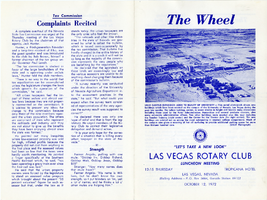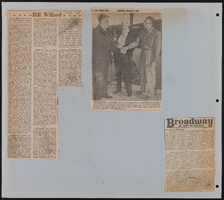Search the Special Collections and Archives Portal
Search Results

The Wheel Las Vegas Rotary Club newsletter, October 12, 1972
Date
Archival Collection
Description
Text

Transcript of roundtable interview with the Holocaust Resource Center: Myra Berkovits, Susan Dubin and Doug Unger, by Barbara Tabach, September 4, 2014
Date
Archival Collection
Description
Interview with Myra Berkovits, Susan Dubin and Doug Unger of the Holocaust Resource Center. In this interview, the group discusses the beginnings of what is now the Sperling Kronberg Mack Holocaust Resource Center. Edythe Katz-Yarchever is discussed as the catalyst for establishing the center and getting others involved with the Governor's Advisory Council on Education Relating to the Holocaust. Berkovits talks about her role as a liason for Holocaust education in the Clark County School District and the student-teacher conferences held each year with funding from Sheldon Adelson. Unger discusses expanding the outreach to the Washoe County School District with assistance from Atlantis Hotel (Reno, Nev.) owner, John Farahi and Judy Mack. They talk about the previous locations of the Holocaust Resource Center on Maryland Parkway, then Renaissance Drive, and the affiliation with the Jewish Federation and the Jewish Family Service Agency. After funding and personnel issues around 2011, the advisory council and the library went through a re-structuring and hired Susan Dubin who organized and catalogued the library collection. The library is now accredited by the Association of Jewish Libraries.
Text
Sawyer, Lynnette Arvelo
Growing up just one block away from New York’s “Museum Mile” and surrounded by cultures from every corner of the world, it’s easy to say that Lynnette Arvelo Sawyer was destined to create her own museum dedicated to the cultures she grew up with. Lynette is a proud Puerto Rican and Afro-Latina from El Barrio of East Harlem in New York; her roots extend from the island of Puerto Rico to the Canary Islands off the coast of Africa.
Person

Transcript of interview with Charles W. Hunsberger by Stefani Evans and Claytee White, July 27, 2016
Date
Archival Collection
Description
It seems counterintuitive that a man who was raised a Mennonite, spoke Pennsylvania Dutch before he spoke English, and was destined to quit school after eighth grade to work on the family farm would grow up to become one of the most progressive and visionary library directors in the United States. His participation in the Building Las Vegas project results from his being responsible for building twenty libraries in Clark County during his 1971–1994 tenure as director of the Las Vegas-Clark County Library District. One of his first controversies was to insist on going to high school after his father demanded he quit. After graduating high school he went to Nigeria on behalf of his church, serving there for five years. Upon returning to the U.S., he found work at the Fort Wayne Library, albeit he was limited by how far he could advance because of his limited education. After attaining his library degree Indiana University at Bloomington he served as director at the Columbia City Library
Text

Transcript of interview with Billy Paul Smith by Claytee White, October 3, 2013
Date
Archival Collection
Description
Chemist, mathematician, and health physicist Billy Paul Smith donates time to tutor young people in hopes of attracting more youth into the fields of math and science. Born in 1942 and schooled in segregated black schools in Shreveport, Louisiana, and Texarkana, Texas, he graduated from high school at age fifteen and enrolled at Prairie View A&M University, where he trained with the Reserve Officer Training Corps (ROTC) and earned his Bachelor’s degree in chemistry and in 1964 his Master’s degrees in chemistry and math. Most young U.S. Army officers in 1964 went to Vietnam, but Billy’s math and science background steered him to the Army Chemical Corps, where he was quickly selected to join a new team. The team was to develop responses to nuclear weapon accidents and worked under the Defense Atomic Support Agency (DASA) in Albuquerque, New Mexico. At the same time, Billy completed the Weapons Ordinance Army course on classified information relating to the U.S. nuclear weapons arsenal. In this interview, Billy talks about his service with DASA and his subsequent twenty-seven years working at the Nevada Test Site in a variety of positions with Reynolds Electrical and Engineering Company, Inc. (REECo), a company that had “percentagewise more blacks in management positions than any other [Las Vegas] company.” He experienced the quiet racism of Las Vegas residential segregation when he tried to purchase a house in a neighborhood he liked and the unexpected kindness of the REECo general manager, Ron Keen, who made sure the Smith family could live where they wanted to live. He talks about Area 51 and explains underground testing activity and offers the scientific and ecological reasons why scientists deemed Yucca Mountain safe to store nuclear waste. After retiring at fifty-two, Billy and a colleague formed an independent instrumentation company, which, from 1995–2005 provided and calibrated radiological measurement and detection instruments for the decommissioning and closure of the Rocky Flats nuclear plant in Golden, Colorado. During that time, Billy rented an apartment in Boulder, but he and Jackie maintained their Las Vegas home, where they still reside. Billy shares memories of places he and his wife used to enjoy on the Westside and tells of their longtime friends in the black community. He also talks about developing his philosophy of philanthropy through Alpha Phi Alpha Fraternity and discusses becoming a member of the Knowledge Fund Advisory Council for the Governor’s Office of Economic Development (GOED) and the advisory council for the Nevada System of Higher Education.
Text

Transcript of interview with Joanna S. Kishner by Barbara Tabach, January 10, 2017
Date
Archival Collection
Description
Joanna Kishner epitomizes the native Southern Nevada who was raised in both a Jewish and secular world of Las Vegas. A daughter of Ellen Neafsey Jobes and Irwin Kishner, she was born in 1964 and graduated from Clark High School in 1982. As she recalls, the halls of Clark High School witnessed a stellar cast of characters in the early 1980s, from future casino executives, to additional judges, to comedian Jimmy Kimmel. Judge Kishner earned a double major in Political Science and Psychology from Claremont McKenna College (1986) and graduated from UCLA School of Law (1989.) She remained in California and worked as senior counsel for Warner Brothers, a division of Time-Warner Entertainment Company and was also an associate with the multi-national firm Paul Hastings Janofsky & Walker. In time, she felt the tug to return to her childhood roots in Las Vegas. She and her husband were married at Temple Beth Sholom, where she had her bat mitzvah and raises her own children in the Jewish tradition. Judge Kishner has been recognized for her legal work throughout the years, this includes pro bono work for disadvantaged children through the Children’s Attorney Project. When she set her sights on becoming a judge, she was joined by her young family as she knocked on thousands of doors to introduce herself and her passion for justice. In 2010, she was elected to Department XXXI of the Eighth Judicial District.
Text

Ashley Vargas interview, October 30, 2018: transcript
Date
Archival Collection
Description
Interviewed by Laurents Banuelos. Elsa Lopez and Claytee White also participate in the questioning. Ashley Vargas, also know by her stage name Ms. Aye Vee is a Las Vegas native born and raised. She has received notoriety in the Las Vegas valley for her raw story telling and poetry. Vargas identifies as an Afro-Latina Puerto Rican. She spent her childhood growing up on the Eastside. She vividly remembers having to navigate several spaces in order to survive the rough neighbors she was in. Today, Vargas uses her poetry to communicate her experiences and set ups workshops to help cultivate young up and coming writers. Please note the following disclaimer: This interview contains language that some may find offensive.
Text

Jocelyn Cortez interview, March 18, 2019: transcript
Date
Archival Collection
Description
Interviewed by Nathalie Martinez. Jocelyn Cortez is a Salvadoran-American immigration lawyer. She grew up on the Eastside of Las Vegas and grew up going to school in the Clark County School District and at UNLV before going to Law School at the University of Arizona. She is an engaged community member as an immigration lawyer working alongside the Culinary Union and the Latino Bar Association.
Text


